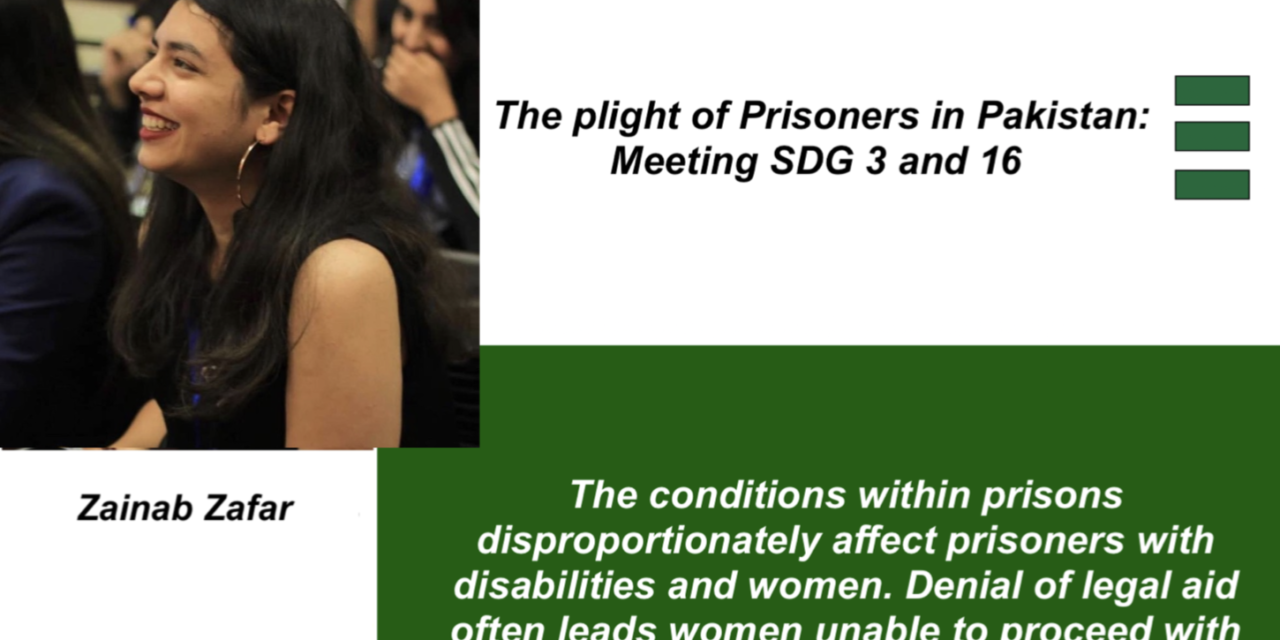Vision 2030 Pakistan aims to meet the Sustainable Development Goals (SDGs) as mandated by the United Nations to achieve a sustainable future and a fairer society for all. While the roadmap for peace under the SDGs aims to uplift marginalized communities, Pakistan seems to have neglected a particular portion of its population, prisoners. Prisoners in Pakistan have been deprived of adequate health care leaving them at risk of fatal diseases and living in inhabitable conditions.
The Sustainable Development Goals, particularly, SDG 3 look at the good health and well-being of all individuals in society. Yet, we often forget prisoners remain a part of our society. An all-encompassing approach to applying the policy under the mandate of SDG 3 requires Pakistan to allocate health care resources to those in prison. The Human Rights Watch in 2023 released a report recognising Pakistan as having one of the most overcrowded prisons in the world. This overcrowding in prisons not only affects SDG 3 but SDG 16 as the lack of legislative reforms towards non-custodial sentencing and bail has led to overcrowding to the extent that jail cells meant to hold 3 prisoners are seen to be accommodating 15 prisoners.
Dilapidated buildings, lack of sanitation and overcrowding have all pushed the deteriorating health of inmates in Pakistani prisons. In 2020, the Islamabad High Court issued a verdict whereby the state would be held accountable where there is an overcrowded prison with a lack of proper sanitation and or inhumane conditions for those who are deprived of their liberty. Despite this ruling, there remains to be effective reforms implemented to provide for the well-being of prisoners.
Achieving SDG 3 here becomes deeply intertwined with SDG 16, Peace, Justice and Strong Institutions. The overcrowding of prisons stems from the backlog in criminal proceedings. In 2020 alone, Pakistan’s Ministry of Human Rights found two-thirds of women detained in Pakistani prisons were yet not convicted of any crime. Without a fair, just and timely trial, overcrowding of prisoners will continue to grow alongside its detrimental effects. The current state of prisons is a testimony to the lack of provision of healthcare but also the dire need to reform legislation pertaining to bail, criminal proceedings, provision of legal aid and unjust detainment.
The conditions within prisons disproportionately affect prisoners with disabilities and women. Denial of legal aid often leads women unable to proceed with their case. The majority of women being detained in prisons in Pakistan due to drug-related crimes with most being held without actual conviction highlights the harrowing status of women in Pakistan living in poverty without access to legal representation and the country’s backlog in criminal proceedings.
Furthermore, women prisoners in Pakistan endure inadequate access to essential medical services such as routine check-ups and gynaecological care. This, alongside a lack of proper sanitation facilities or products, leads to unaddressed health conditions and increased complications for women’s health. Pakistani prisons not only lack an adequate allocation of medical facilities but also trained female healthcare professionals. Without the provision of these facilities, the problem is exacerbated.
Women within prisons also carry fear and stigmatization deterring them from seeking medical attention. Custodial deaths in Pakistani prisons have been in the spotlight for a while yet we still see no implementation of reforms. Mistreatment at the hands of staff and other prisoners often leads to sexual assault or fatal injuries to female prisoners. Without accountability on all ends Pakistan continues to fail a fragment of its society that we seem to constantly choose to neglect. Equally, this reflects the essential need for progress in areas pertaining to SDG 1 no poverty, SDG 3 good health and well-being, SDG 5 gender equality and SDG 16 Strong institutions.
The sustainable development goals are interlinked, with the provision of healthcare in prisons not only do we grow one step closer to meeting SDG 3 but equally we move towards rehabilitation of prisoners which can help us achieve SDG 1 and SDG 5. All in all, with better conditions in prisons we grow one step closer to meeting SDG 16 and ensuring strong institutions. This all-encompassing approach can uplift not only the standard of living that is the state’s responsibility for those in prisons but can also help in lowering second-time offences and push for stronger policies towards bail and legal aid.
The plight of prisoners with disabilities is also a challenge faced by Pakistan, as inadequate care within correctional facilities leads to their deteriorating health and diminishes the basic quality of life they are entitled to. Addressing the healthcare needs of disabled prisoners is not only a moral imperative but also a legal obligation under international jurisdiction.
The urgent need for reforms in Pakistan’s prison system is evident now more than ever. With the detrimental effects it carries, we neglect a portion of our society without a fair and just trial. Meeting Vision 2030 requires Pakistan to take steps with all marginalized communities in mind to ensure an effective and strong policy.
Write is a student based in Islamabad


